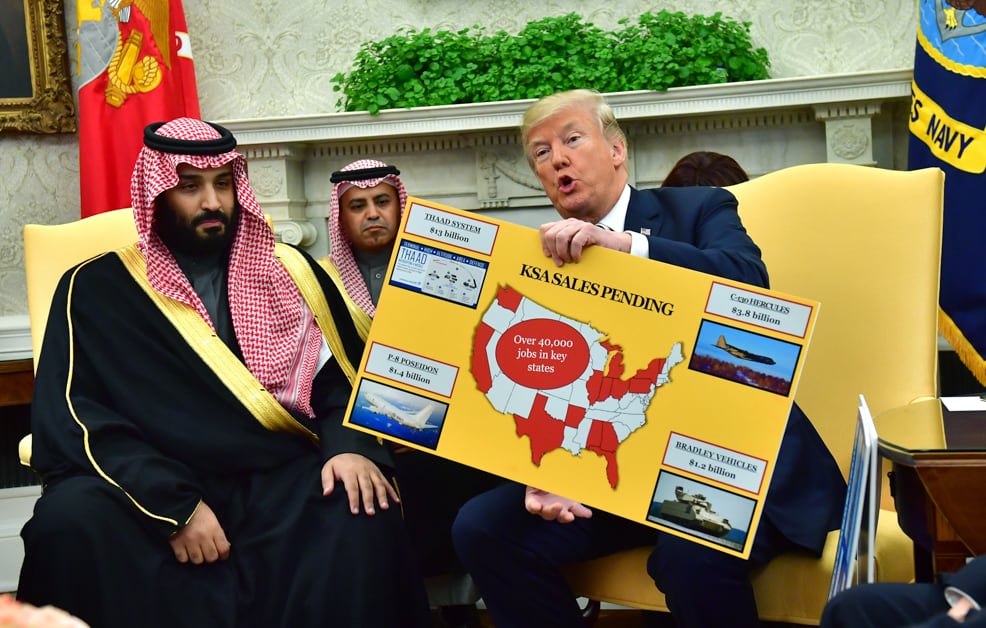BEIRUT — Chicago-based Boeing and state-owned Saudi Arabian Military Industries (SAMI) signed on March 30 a memorandum of agreement (MoA) to develop a new joint venture aiming to localize more than 55 percent of the maintenance, repair and overhaul services for fixed and rotary-wing military aircraft in the Kingdom.
According to a Boeing statement, the joint venture is expected to post revenues in excess of $22 billion by 2030 and create 6,000 jobs and training opportunities for Saudi youth. A total of $450 million will be invested in facilities and equipment in Saudi Arabia.
RELATED

The joint venture will also support the ambitious Vision 2030 plan, while strengthening the Kingdom’s defense capabilities and enhancing its deterrent potential.
Spokesman Dennis Scott Day, a spokesman at Boeing Defense Space and Security, described the MoA as “the first step to expand the aerospace ecosystem in the Kingdom under Vision 2030 to include not only sustainment, but also manufacturing, training, engineering, and R&D.”
In addition, the agreement will transfer technology to install weaponry on the aircraft as well as localize the supply chain for spare parts in the Kingdom.
“The SAMI-Boeing JV provides a unique opportunity to accelerate localization through Boeing’s strong local presence and relationships, SAMI’s leadership role in Vision 2030 aerospace localization, Boeing’s existing KSA joint ventures, the large KSA installed base of military systems and Boeing’s unparalleled services capabilities,” Day added.
Leanne Caret, President and CEO, Boeing Defense, Space and Security added in a statement that “with this local capability dedicated to sustaining all U.S.-made defense platforms, we can better serve our customers and support the Kingdom’s goals of localization and economic growth.”
SAMI is a relatively new government-owned military industries firm focusing on air and land systems, weaponry, missiles, and defense electronics. The goal is expansion of Saudi Arabia’s gross domestic product and domestic job opportunities in engineering and technology, by localizing more than 50 percent of the Kingdom’s military spending by 2030.
The creation of SAMI was announced in May 2017. The 100 percent government-owned entity aims to become one of the world’s top 25 defense companies by 2030.
Chairman of SAMI, H.E. Ahmed Al-Khateeb, commented on this milestone saying “Boeing has a long-standing commitment to Saudi Arabia, and is extremely keen on expanding its footprint in the country. SAMI is exploring all collaborative opportunities to build a strong autonomous military industries ecosystem in the Kingdom.”
“In addition to local sustainment capabilities, the inevitable partnership between the two companies could explore the creation of intellectual property as well,” said SAMI CEO Andreas Schwer.
Although the timeframe to begin work on Saudi military platforms has not yet been determined, the Boeing official stressed that the “formation of the joint venture will be subject to the parties reaching definitive agreement with the other shareholders of Boeing’s existing KSA joint ventures on an initial buy-in transaction, and then customary closing conditions, including receipt of required regulatory clearances.”
Once the MoA is operational, the joint venture will provide a foundation for future platform sales and for expanding Boeing’s presence in the Kingdom to support market growth for both commercial and defense programs.
It is worth noting that Boeing’s partnership with Saudi Arabia dates back more than 70 years. It began on February 14, 1945, when U.S. President Franklin Roosevelt presented a twin-engine Dakota DC-3 airplane (manufactured by Boeing’s heritage company Douglas Aircraft) to King Abdulaziz Al Saud.

Another milestone dates back to 2015 when Alsalam Aircraft Company, Boeing and Saudi Aerospace Engineering Industries (SAEI) signed an agreement to create the Saudi Rotorcraft Support Company. The joint venture will provide rotorcraft maintenance, repair and overhaul to support the Saudi rotorcraft fleet.
The Saudi Rotorcraft Support Company CEO, Neil Bevan, told Defense News last November that the Apache is expected to be the first platform to get work, noting that the “repairs will involve a full strip down of the aircraft and a structural assessment of every component.”
“Our main focus will be the after sales support of those airframes doing both aircraft MRO in our facilities in Riyadh and component MRO in our facilities in Jeddah,” he added.
Chirine Mouchantaf contributed stories on Middle East defense and wrote for SDArabia, an Arabic security and defense magazine.








